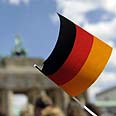
Pop pioneer hails Germany despite Holocaust misery
Composer of electronic hit 'Popcorn' Gershon Kingsley grateful for growing up in Berlin before fleeing to Israel in 1938. 'German culture unique in the history of humankind,' he says
As a teenager, Gershon Kingsley was forced to flee his home, friends and family to escape the Nazis - but the composer of evergreen electronic hit "Popcorn" is still grateful that he grew up in Germany.
Cast out of Berlin into Middle Eastern deserts aged just 15, Kingsley would not see his family for eight years after he fled to what is now Israel before the Kristallnacht pogrom in 1938.
But though he did not write Popcorn for three more decades, the Moog synthesizer pioneer said the artistic legacy of his native country was one of the keys to understanding his music.
"I am glad I was born in Germany and partook of German culture. Because whether you're talking about Beethoven, Goethe or Wagner, it's unique in the history of humankind," Kingsley told Reuters in a telephone interview from New York.
"Popcorn is a classical melody, it could easily be incorporated into a Bach piece," he added. "It's so transparent - it's like why you can't change a Mozart melody. It took me five minutes. But I could never do it again."
One of the most ubiquitous tunes in the history of electronic music, Popcorn has been covered hundreds of times and used in everything from commercials to films and computer games.
Yet the tale of its success is almost as unusual as the life of Kingsley, who was born Goetz Gustav Ksinski in the western city of Bochum to a Jewish father and Catholic mother in 1922.
"On my gravestone it will say 'The composer of Popcorn'. Unfortunately. I've had enough popcorn," said Kingsley, whose constant laughter and rapid-fire delivery belie his 87 years.
No roots
Though Kingsley first released Popcorn in 1969, it did not become an major hit until a member of his Moog quartet re-recorded the tune under the name Hot Butter in 1972.
This, he said, "created a lot of bad blood." But worse was to follow when he discovered he had unwittingly already sold half the publishing rights to the 2-1/2 minute melody.
"It took a long time to get over that," he said.
Kingsley was nearly 50 by the time the tune became famous, prompting disbelief among many that he had written it.
He recalled: "When I went to pick up my first golden record in Germany they said to me 'You wrote Popcorn?'"
Popcorn, which has been covered by artists ranging from Jean-Michel Jarre to Herb Alpert and Muse, proved a particular hit in France and Germany, where Kingsley, who still works, returned to live for several years in the 1970s and the 1990s.
By then, Kingsley had spent decades living in the United States, where he arrived in 1946 to be reunited with his family after working on a kibbutz and serving in the colonial army in what was once the British Mandate of Palestine.
"I was guarding the settlements on a white horse," he said.
Before he reached Palestine, a Zionist youth group Kingsley belonged to had paid an "ideological Nazi farmer" to teach Jewish boys how to farm. In return, the farmer made his charges wade through "human manure, half naked," Kingsley recalled.
"It was not a very pleasant experience. It's impossible to understand what happened to the German collective soul for so many years," he said, referring to the Nazi era.
Today, Germany is one of the most enlightened countries in the world, said Kingsley, who has been a US citizen for years.
"If you make a friend in Germany then you have them for the rest of your life. It's much harder to break a friendship in Germany than it is in America," he said.
Recent developments on the right of the US political spectrum have made Kingsley think about his difficult past.
"This country is going through a tremendous transformation which I don't quite understand. When you see what's going on with the Tea Party movement and the Republicans, it's almost like a repeat of what happened in the 1930s in Europe," he said.
Yet all his life Kingsley has felt a certain rootlessness, he said, reflecting on his choice of the name Gershon.
"In the bible it was spelt with an 'm'," he said. "Gershom was the only son of Moses. The name means "stranger there." So it's a good name for me. I'm always a stranger wherever I go. Whether I'm German or American or whatever."










